

Director: Peter Jackson, 2003. (Extended edition)
By 2003, it was apparent that Jackson had created something magical and fantastic with his The Lord of the Rings Trilogy. Though the Academy snubbed the earlier two films, with Oscars only for sound, vision and make-up (four for The Fellowship of the Ring and two for The Two Towers), they seemed to make up for this by awarding 11 Oscars to this final chapter. Matching Ben Hur and Titanic, this is the most Oscars won by any film. And this time, Jacson's film earned Best Picture and Best Director honors. Surprisingly, it garnered no acting wins.
Unlike The Two Towers Jackson provides a prolog, a flashback showing how Smeagel (Andy Serkis) won the Ring and was corrupted by its power, turning into the creature Gollum. Then back into the present, we see Gollum leading Frodo (Elijah Wood) and Sam (Sean Astin) into Shelob's lair. As a former Ringbearer he has a plan to regain "his precious." Trouble is brewing.
Trouble also faces the men of Gondor in the city of Minas Tirith. Kingless, they are led by Denethor (John Noble) the current steward. When Osgiliath falls to Sauron's orcs, he charges Faramir (Davud Wenham), his younger son to lead a suicide mission to retake the castle, since Boromir his favorite son died earlier. It is a poignant scene when these warriors leave knowing they will fail. Worse, though, are his words when Faramir says, "You wish now that our places had been exchanged . . . that I had died and Boromir had lived." Denethor despondently whispers, "Yes. I wish that."
Denethor gives us a picture of a poor father. He had favored Boromir (Sean Bean) as first-born, a stronger warrior than Faramir. He looked down upon his younger son, even telling Boromir, in The Two Towers, "Do not trouble me with Faramir. I know his uses and they are few." What damage he did. And what damage we do when we play favorites with our children. Our disapproval can wound beyond healing. God has blessed us with children who are unique and not to be compared to one another. As a parent, our job is to "train up the child in the way he should go" (Prov. 22:6). And then release them to the unique paths prepared for them. If we are like Denethor, we may end up sending our unfavored children on psychologically suicidal missions of their own. What a sad price to pay!
 The Two Towers ended with hope hanging by a thread, and this continues. Realizing where the hope of Middle Earth lay, Pippin asks Gandalf, "Is there any hope, Gandalf, for Frodo and Sam?" Gandalf retorts, "There never was much hope. Just a fool's hope." But they keep going for where there is even a ray of hope, men can draw strength.
The Two Towers ended with hope hanging by a thread, and this continues. Realizing where the hope of Middle Earth lay, Pippin asks Gandalf, "Is there any hope, Gandalf, for Frodo and Sam?" Gandalf retorts, "There never was much hope. Just a fool's hope." But they keep going for where there is even a ray of hope, men can draw strength.Sometimes that hope must be manufactured. When Theoden (Bernard Hill) refuses to go to the aid of the men of Gondor unless requested, Gandalf and Pippin ride to Gondor to surreptitiously light the beacon. Aragorn sees the call: "The Beacons of Minas Tirith! The beacons are lit. Gondor calls for aid." It is a terrific moment when Theoden declares regally, "And Rohan will answer. Muster the Rohirrim. Assemble the army at Dunharrow. As many men as can be found. You have two days. On the third, we ride for Gondor . . . and war."
The Return of the King sets up the magnificent Battle of Gondor on the Pelennor Fields. It is spectacular, with men facing orcs, oliphants bearing mercenaries, and even the Witch King of Angmar, the Ringwraith riding on his flying beast. But victory in this battle can only be accomplished by the return of the king with his rightful sword. Aragorn had hidden as a ranger, calling himself Stryder for too long. He had refused to accept his position as son of Arathorn and hence heir of Isildur, the son of man who could raise the blade that once before defeated Sauron and separated him from his Ring.
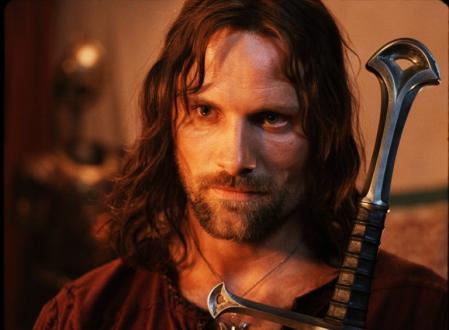 Aragorn is called to his destiny when the night is darkest and hope is at its dimmest. He tells Elrond (Hugo Weaving, The Matrix), "Sauron will not have forgotten the sword of Elendil. The blade that was broken shall return to Minas Tirith." Elrond challenges him, "The man who can wield the power of this sword can summon to him an army more deadly than any that walks this earth. Put aside the ranger. Become who you were to born to be."
Aragorn is called to his destiny when the night is darkest and hope is at its dimmest. He tells Elrond (Hugo Weaving, The Matrix), "Sauron will not have forgotten the sword of Elendil. The blade that was broken shall return to Minas Tirith." Elrond challenges him, "The man who can wield the power of this sword can summon to him an army more deadly than any that walks this earth. Put aside the ranger. Become who you were to born to be."Aragorn must rise to his destiny. He is the returning King. He points us to Christ who will return one day as the ruling King, bringing an army to conquer all the forces of evil (Rev. 19:11-21). At his first coming, Jesus was King but he did not act like a king. He had no army. He came in meekness and humility rather than in pomp and splendor. He was crucified as "King of the Jews" (Mark 15:26) but the Jews denied his kingship and decried him as their Messiah. His destiny had not arrived.
What is our destiny? Who does Elrond challenge us to be? We were born sons of Adam, with a sin-tainted nature. But Jesus' death and subsequent resurrection calls out to us: we are born to be children of the King (Jn. 1:12). In Jesus, through faith in his finished work on the cross, we can become an heir of his, a son or daughter of God. "Isildur's heir," the Son of Man, has made it possible for us to be co-rulers with him upon his regal return (Rev. 20:6).
 If The Return of the King centers on the story of Aragorn, it does not forget the story of Frodo. As the film winds through Mordor towards its climax, the power of the Ring begins to corrupt even this little hobbit. But Frodo is a Christ-figure, saves the day and the whole of Middle Earth.
If The Return of the King centers on the story of Aragorn, it does not forget the story of Frodo. As the film winds through Mordor towards its climax, the power of the Ring begins to corrupt even this little hobbit. But Frodo is a Christ-figure, saves the day and the whole of Middle Earth.As Aragorn was a version of Christ, so too is Frodo. His path was the humble one, as was Jesus at his first coming. He set his face like flint to accomplish the mission without turning back. So did Jesus (Isa. 50:7). Just like Frodo, Jesus felt the onerous weight of his mission just before he arrived at the end. In the Garden of Gethsemane Jesus cried out that God might take the cup of wrath away (Matt. 26:39). If there was any other way that would enable him to avoid the cross, he prayed for it. But that was not the will of the Father. No, evil had to be cast into the fires. Sacrifice was necessary (Heb. 9:22). As the tag-line says, "there can be no triumph without loss; no victory without suffering; no freedom without sacrifice." This could be just as easily referring to the first coming and final return of the true King Jesus.
When the battles are all done, when the war is won, and we expect the movie to close out in Hollywood fashion with a quick conclusion, Jackson has a surprise for us. There is still almost an hour left in the extended version. Craig Detweiler, in his book "Into the Dark", asks "why did he have to take us back to the Shire after such a stirring wedding and coronation?" He answers his own question and highlights the way we can connect with this conclusion and with the themes of the three films:
But perhaps I misunderstood Tolkien's intent. The fellowship did not take on the task for profit or glory. The battles were fought to return to life as they knew it -- a modest existence in a remote village. In Tolkien's novels, the Company of Nine do not take up arms with shouts of 'Liberty, Equality and Fraternity.' Their battle cry is decidely local: 'The Shire!' . . . . This connects the dots between God's questions [from Gen. 1-4]. How do we remember who we are? By joining with our brothers and sisters, forming communities in action. We discover where we are as we answer, 'Who is my brother or sister?' These are the bonds of fellowship that triumph and endure, resisting temptation, overcoming evil.Copyright ©2010, Martin Baggs

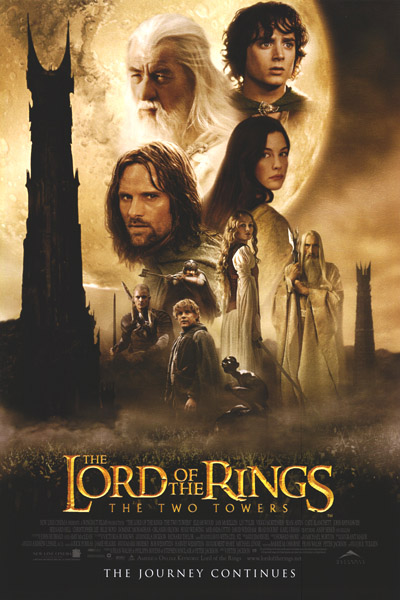

 When Theoden (Bernard Hill), King of Rohan is freed of the evil trickery of Grima Wormtongue (Brad Dourif) that kept him spell-bound and under the control of Samuran (Christopher Lee), he too sees a hopeless situation and orders an evacuation of the land. All his people would pull back to Helm's Deep. There they will take their final stand, joined by Aragorn, Gimli and Legolas. One of the highlights of this film is the Battle of Helm's Deep, where a few hundred farmers and boys take on thousands of orcs. Hopelessly outnumbered, they are prepared to fight to the death following the leadership of their king and of Aragorn, a born leader.
When Theoden (Bernard Hill), King of Rohan is freed of the evil trickery of Grima Wormtongue (Brad Dourif) that kept him spell-bound and under the control of Samuran (Christopher Lee), he too sees a hopeless situation and orders an evacuation of the land. All his people would pull back to Helm's Deep. There they will take their final stand, joined by Aragorn, Gimli and Legolas. One of the highlights of this film is the Battle of Helm's Deep, where a few hundred farmers and boys take on thousands of orcs. Hopelessly outnumbered, they are prepared to fight to the death following the leadership of their king and of Aragorn, a born leader. When hope starts to leak and falter, encouragement is neeed. While the remaining members of the fellowship are in different battles, Frodo and Sam are being led, tired and hungry, across the uninviting landscape of Mordor. Getting closer to Sauron, Frodo's hope begins to fail, "I can't do this, Sam." Their battle is internal, more insidious. But Sam was commissioned by Gandalf in
When hope starts to leak and falter, encouragement is neeed. While the remaining members of the fellowship are in different battles, Frodo and Sam are being led, tired and hungry, across the uninviting landscape of Mordor. Getting closer to Sauron, Frodo's hope begins to fail, "I can't do this, Sam." Their battle is internal, more insidious. But Sam was commissioned by Gandalf in  Indeed, in
Indeed, in 


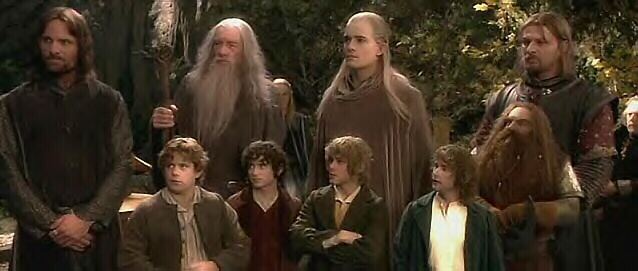 The first film focuses on the fellowship. They must put aside differences and unite in the common cause if they are to gain victory. Through forests and mines, they face trouble from orcs and trolls. But the power of friendship holds the upper hand.
The first film focuses on the fellowship. They must put aside differences and unite in the common cause if they are to gain victory. Through forests and mines, they face trouble from orcs and trolls. But the power of friendship holds the upper hand. The Fellowship is tested by the trials it faces. Along the way, some are tempted, some are lost. One thing is clear: the Ring is cursed. If it calls to its Master and Maker, it also affects the hearts of those around it. We see a glimpse of the creature Gollum, whose sad life has been poisoned by the power of the Ring. We feel it separating Frodo from his fellows. He is even told by Galadrial, "You are a Ring-Bearer, Frodo. To bear a Ring of Power is to be alone." We see it darken even this bright elf queen herself, and Gandalf understands the subtlety of its temptation. Most of all we see Boromir, the strong warrior craving its power for his people.
The Fellowship is tested by the trials it faces. Along the way, some are tempted, some are lost. One thing is clear: the Ring is cursed. If it calls to its Master and Maker, it also affects the hearts of those around it. We see a glimpse of the creature Gollum, whose sad life has been poisoned by the power of the Ring. We feel it separating Frodo from his fellows. He is even told by Galadrial, "You are a Ring-Bearer, Frodo. To bear a Ring of Power is to be alone." We see it darken even this bright elf queen herself, and Gandalf understands the subtlety of its temptation. Most of all we see Boromir, the strong warrior craving its power for his people. At one point in
At one point in 

 Ritchie's Sherlock Holmes is as strong physically as he is mentally. This comes across clearly in a bare-knuckle fight scene. In the ring with a brute of a boxer, surrounded by gambling Cockneys, Holmes is simply playing with the man until his patience wears thin. Then Ritchie shows Holmes thinking through his planned moves and counter-moves like a chess grand-master, elaborating the extent of the upcoming injuries, all in a stop-action visual approach. Once satisfied with his attack, Holmes executes it swiftly. What a kick, literally! This is Holmes the brawler. That is part of the fun, as Ritchie lets us see from Holmes perspective, giving insight into the man and his phenomenal thinking.
Ritchie's Sherlock Holmes is as strong physically as he is mentally. This comes across clearly in a bare-knuckle fight scene. In the ring with a brute of a boxer, surrounded by gambling Cockneys, Holmes is simply playing with the man until his patience wears thin. Then Ritchie shows Holmes thinking through his planned moves and counter-moves like a chess grand-master, elaborating the extent of the upcoming injuries, all in a stop-action visual approach. Once satisfied with his attack, Holmes executes it swiftly. What a kick, literally! This is Holmes the brawler. That is part of the fun, as Ritchie lets us see from Holmes perspective, giving insight into the man and his phenomenal thinking. This brings us to one of the highlights of the film: the chemistry between Holmes and Watson. Downey Jr and Law hit it off as a pair who have moved beyond superficial friendship. They are like the odd couple, knowing each other better than a married pair. When Holmes gripes, "You've never complained about my methods before," Watson retorts: "I've never complained! When have I ever complained about you practicing the violin at three in the morning, or your mess, your general lack of hygiene, your experiments on my dog, or the fact that you steal my clothes?" Dripping sarcasm, they are comfortable with each other, vices and all. Although Watson brings more of the comedic relief, the film is stronger when he is with Holmes on screen.
This brings us to one of the highlights of the film: the chemistry between Holmes and Watson. Downey Jr and Law hit it off as a pair who have moved beyond superficial friendship. They are like the odd couple, knowing each other better than a married pair. When Holmes gripes, "You've never complained about my methods before," Watson retorts: "I've never complained! When have I ever complained about you practicing the violin at three in the morning, or your mess, your general lack of hygiene, your experiments on my dog, or the fact that you steal my clothes?" Dripping sarcasm, they are comfortable with each other, vices and all. Although Watson brings more of the comedic relief, the film is stronger when he is with Holmes on screen. As the film progresses and moves to its conclusion Irene Adler (Rachel McAdams,
As the film progresses and moves to its conclusion Irene Adler (Rachel McAdams, 

 This introduction finds the Bielski family touched by tragedy. When Zus returns home from the forest with another brother, he finds the village empty, massacred. Their father and uncles lie dead, ruthlessly killed. Asael survived by hiding, but now the three brothers take to the forest, where they are joined by Tuvia. Their plan is to survive alone, a small band of brothers, living for themselves. That plan comes into question when they find other Jews, old and weak, frail and female, unfamiliar with surviving in the forests. Tuvia, the oldest brother and clear leader, accepts them into his group, even though he has little food or medicine.
This introduction finds the Bielski family touched by tragedy. When Zus returns home from the forest with another brother, he finds the village empty, massacred. Their father and uncles lie dead, ruthlessly killed. Asael survived by hiding, but now the three brothers take to the forest, where they are joined by Tuvia. Their plan is to survive alone, a small band of brothers, living for themselves. That plan comes into question when they find other Jews, old and weak, frail and female, unfamiliar with surviving in the forests. Tuvia, the oldest brother and clear leader, accepts them into his group, even though he has little food or medicine.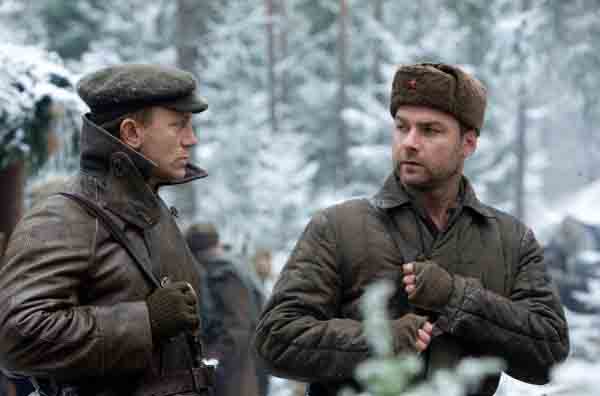 As the group grows, Tuvia and Zus have different ideas on how to defy the Germans and gain freedom. Zus wants to join the Russian partisan soldiers, also hiding in the forest, and fight the invaders. But Tuvia wants to continue to foster an open and welcoming community. These two leaders come head to head to literally fight over the leadership and future of this motley crew. Which is better? Defiance by fighting for freedom? Or defiance by living in freedom? These two provide the extremes of the options explored in Defiance.
As the group grows, Tuvia and Zus have different ideas on how to defy the Germans and gain freedom. Zus wants to join the Russian partisan soldiers, also hiding in the forest, and fight the invaders. But Tuvia wants to continue to foster an open and welcoming community. These two leaders come head to head to literally fight over the leadership and future of this motley crew. Which is better? Defiance by fighting for freedom? Or defiance by living in freedom? These two provide the extremes of the options explored in Defiance. So, is it better to "fight" for freedom by living, and perhaps dying in actual freedom, enjoying what community there is among like-minded people, or to literally fight with those who look down on you? The other alternative is to give in and "live" with badges on the lapels behind the gates of the ghetto, never knowing when the enemy will ship you out to the labor/death camps. Zwick makes the answer clear when Zus rejoins Tuvia.
So, is it better to "fight" for freedom by living, and perhaps dying in actual freedom, enjoying what community there is among like-minded people, or to literally fight with those who look down on you? The other alternative is to give in and "live" with badges on the lapels behind the gates of the ghetto, never knowing when the enemy will ship you out to the labor/death camps. Zwick makes the answer clear when Zus rejoins Tuvia.

 Home from college for the summer, Frank is in love with Natalie Strout (Marisa Tomei,
Home from college for the summer, Frank is in love with Natalie Strout (Marisa Tomei,  Frank's relationship with Natalie also proves to be a point of contention between his parents, the sword that divides them from one another after years of marriage. In an uncharacteristic outburst, Matt yells at Ruth: "He went there because of you. Because you are so controlling, so overbearing, so angry . . . You are so unforgiving." He blames his wife's unforgiving spirit and bitterness for driving Frank away from them.
Frank's relationship with Natalie also proves to be a point of contention between his parents, the sword that divides them from one another after years of marriage. In an uncharacteristic outburst, Matt yells at Ruth: "He went there because of you. Because you are so controlling, so overbearing, so angry . . . You are so unforgiving." He blames his wife's unforgiving spirit and bitterness for driving Frank away from them.

 Anger is a key theme running throughout this dark chapter of the series. Palpatine is right: sometimes anger gives focus. There is a place for focused righteous anger. Jesus showed this when he cast the money-changers out of the Temple courts (Jn. 2:14-15), since they were sinning. But more often anger brings tunnel vision and loss of perspective. Too frequently it leads us to actions that we later regret. It is why Paul said, " 'In your anger do not sin': Do not let the sun go down while you are still angry" (Eph. 4:26). And Anakin's anger will become the death of him.
Anger is a key theme running throughout this dark chapter of the series. Palpatine is right: sometimes anger gives focus. There is a place for focused righteous anger. Jesus showed this when he cast the money-changers out of the Temple courts (Jn. 2:14-15), since they were sinning. But more often anger brings tunnel vision and loss of perspective. Too frequently it leads us to actions that we later regret. It is why Paul said, " 'In your anger do not sin': Do not let the sun go down while you are still angry" (Eph. 4:26). And Anakin's anger will become the death of him.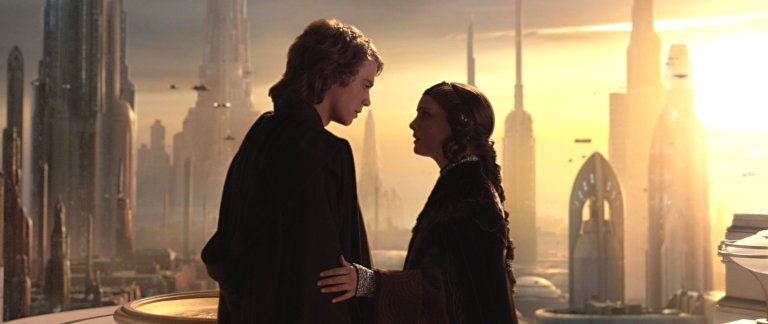 Later, reunited with Padme, his secret bride, she tells Anakin that she is pregnant. This news brings joy but also trouble, as Anakin has visions of Padme dying in childbirth. Like the troubling dreams he had of his mother in Episode 2, he wants to take action. Angrily he tells her he wants the power of life and death, to be immortal and to offer immortality. In short, he wants to be like God. If
Later, reunited with Padme, his secret bride, she tells Anakin that she is pregnant. This news brings joy but also trouble, as Anakin has visions of Padme dying in childbirth. Like the troubling dreams he had of his mother in Episode 2, he wants to take action. Angrily he tells her he wants the power of life and death, to be immortal and to offer immortality. In short, he wants to be like God. If 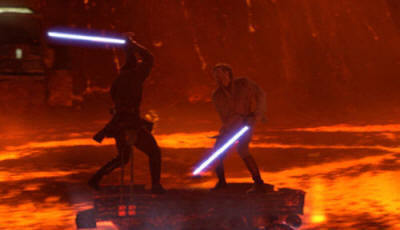 The film has several classic light saber duels. In Coruscent, Master Yoda faces off with Darth Sidious, and loses. On Utapau, Obi-Wan battles Grievous, who wields four sabers. And then in the thrilling finale, Anaken squares off against his mentor, Obi-Wan. Set against the molten lava cascading from the volcanoes of Mustafar, Obi-Wan defeats Anakin leaving him alone, without legs and arms, burning and dying. This fight presages the later fight in
The film has several classic light saber duels. In Coruscent, Master Yoda faces off with Darth Sidious, and loses. On Utapau, Obi-Wan battles Grievous, who wields four sabers. And then in the thrilling finale, Anaken squares off against his mentor, Obi-Wan. Set against the molten lava cascading from the volcanoes of Mustafar, Obi-Wan defeats Anakin leaving him alone, without legs and arms, burning and dying. This fight presages the later fight in  Formerly Anakin had been considered the chosen one who would bring balance to the Force (
Formerly Anakin had been considered the chosen one who would bring balance to the Force (

 It is on Naboo that Anakin falls in love with Padme. As his feelings for her grow stronger she comments, "It must be difficult having sworn your life to the Jedi . . . not being able to visit the places you like . . . or do the things you like." (These would include Tatooine, where his mother still lives.) He responds, "Or be with the people I love." But Padme asks him the key question, "Are you allowed to love? I thought that was forbidden for a Jedi." With twisted reasoning, Anakin answers, "Attachment is forbidden. Possession is forbidden. Compassion, which I would define as unconditional love, is essential to a Jedi's life. So you might say that we are encouraged to love."
It is on Naboo that Anakin falls in love with Padme. As his feelings for her grow stronger she comments, "It must be difficult having sworn your life to the Jedi . . . not being able to visit the places you like . . . or do the things you like." (These would include Tatooine, where his mother still lives.) He responds, "Or be with the people I love." But Padme asks him the key question, "Are you allowed to love? I thought that was forbidden for a Jedi." With twisted reasoning, Anakin answers, "Attachment is forbidden. Possession is forbidden. Compassion, which I would define as unconditional love, is essential to a Jedi's life. So you might say that we are encouraged to love." Feelings prove to be the start of Anakin's undoing. Padme tells him, "To be angry is to be human," but he thinks otherwise: "I am a Jedi. I can be better than this." When she tells him, "You're not all-powerful, Ani," his dark delusion comes to the fore: "Well, I should be."
Feelings prove to be the start of Anakin's undoing. Padme tells him, "To be angry is to be human," but he thinks otherwise: "I am a Jedi. I can be better than this." When she tells him, "You're not all-powerful, Ani," his dark delusion comes to the fore: "Well, I should be." As the film flies to its close, Obi-Wan discovers an army cloned from the bounty hunter Jango Fett (Temuera Morrison) on Kamino. There also emerges a plot by Count Dooku (Christopher Lee), a renegade Jedi, who is in cohorts with a separatist faction and the mechanical General Grievous. In a final controntation with Dooku, Anakin rushes into the fight, led by his emotions, and loses an arm, like his son does in
As the film flies to its close, Obi-Wan discovers an army cloned from the bounty hunter Jango Fett (Temuera Morrison) on Kamino. There also emerges a plot by Count Dooku (Christopher Lee), a renegade Jedi, who is in cohorts with a separatist faction and the mechanical General Grievous. In a final controntation with Dooku, Anakin rushes into the fight, led by his emotions, and loses an arm, like his son does in 

 Eventually, after an exciting submarine chase through the core of Naboo, Qui-Gon and Obi-Wan rescue Queen Padme Amidala (Natalie Portman) and her entourage and escape to Tatooine, where it all began so long ago . . . in the future. It is here that they meet the young slave boy Anakin Skywalker (Jake Lloyd) and his master Watto, the flying Toydarian junk dealer. When his mother Schmi (Pernilia August) relates his birth story, Qui-Gon knows Anakin is someone special: "There was no father. I carried him. I gave birth, I raised him. I can't explain what happened."
Eventually, after an exciting submarine chase through the core of Naboo, Qui-Gon and Obi-Wan rescue Queen Padme Amidala (Natalie Portman) and her entourage and escape to Tatooine, where it all began so long ago . . . in the future. It is here that they meet the young slave boy Anakin Skywalker (Jake Lloyd) and his master Watto, the flying Toydarian junk dealer. When his mother Schmi (Pernilia August) relates his birth story, Qui-Gon knows Anakin is someone special: "There was no father. I carried him. I gave birth, I raised him. I can't explain what happened." Anakin's ability to handle a pod-racer, a super-fast hovercraft, further solidifies Qui-Gon's suspicions. He turns to Master Jedi Yoda (voice of Frank Oz) and Jedi Mace Windu (Samuel L. Jackson) telling them about this "vergence in the force" located around Anakin. "His cells have the highest concentration of midi-chlorians I have seen in a life-form. It was possible he was conceived by the midi-chlorians." To this Mace Windu responds, "You refer to the prophecy of The One who will bring balance to the Force. You believe it's this boy?" Qui-Gon does indeed. Later, just before he dies Qui-Gon tells Obi-Wan, "He is the chosen one. He will bring balance. Train him."
Anakin's ability to handle a pod-racer, a super-fast hovercraft, further solidifies Qui-Gon's suspicions. He turns to Master Jedi Yoda (voice of Frank Oz) and Jedi Mace Windu (Samuel L. Jackson) telling them about this "vergence in the force" located around Anakin. "His cells have the highest concentration of midi-chlorians I have seen in a life-form. It was possible he was conceived by the midi-chlorians." To this Mace Windu responds, "You refer to the prophecy of The One who will bring balance to the Force. You believe it's this boy?" Qui-Gon does indeed. Later, just before he dies Qui-Gon tells Obi-Wan, "He is the chosen one. He will bring balance. Train him." This prophecy of Anakin's future makes him appear to be a Christ-figure, though we know this is not so. But it points back to biblical prophecies of the true Christ. Micah had foretold of Jesus' birth in Bethlehem: "for out of you will come a ruler who will be the shepherd of my people Israel" (Mic. 5:2, Matt. 2:6). Isaiah had said, ""Here is my servant whom I have chosen, the one I love, in whom I delight; I will put my Spirit on him, and he will proclaim justice to the nations" (Isa. 42:1, Matt. 12:18). He is the chosen one. And then when the baby Jesus was presented in the temple, the old man Simeon prophesied over him, "Sovereign Lord, as you have promised, 'My eyes have seen your salvation, which you have prepared in the sight of all people, a light for revelation to the Gentiles and for glory to your people Israel.' " (Lk. 2:30-32) Jesus would bring balance to this sin-infected world by providing the means for redemption (Rom. 3:24).
This prophecy of Anakin's future makes him appear to be a Christ-figure, though we know this is not so. But it points back to biblical prophecies of the true Christ. Micah had foretold of Jesus' birth in Bethlehem: "for out of you will come a ruler who will be the shepherd of my people Israel" (Mic. 5:2, Matt. 2:6). Isaiah had said, ""Here is my servant whom I have chosen, the one I love, in whom I delight; I will put my Spirit on him, and he will proclaim justice to the nations" (Isa. 42:1, Matt. 12:18). He is the chosen one. And then when the baby Jesus was presented in the temple, the old man Simeon prophesied over him, "Sovereign Lord, as you have promised, 'My eyes have seen your salvation, which you have prepared in the sight of all people, a light for revelation to the Gentiles and for glory to your people Israel.' " (Lk. 2:30-32) Jesus would bring balance to this sin-infected world by providing the means for redemption (Rom. 3:24).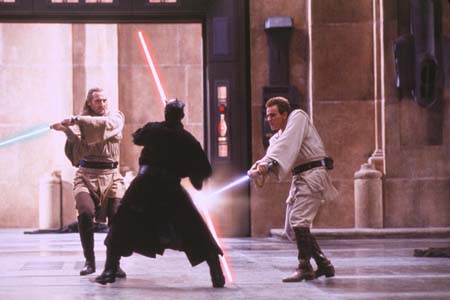 The two highlights of The Phantom Menace are the pod-race and the light saber duel between Qui-Gon and Darth Maul. Even though the savage pod-race is a modern version of the Ben Hur chariot race, it is nevertheless thrilling, pitting Anakin against Sebulba in a race for Anakin's freedom. Then the saber fight sets Qui-Gon's traditional saber against Darth Maul's dual-ended sword. Unfortunately, we see too little of Maul and learn next to nothing about him. He is no Vader.
The two highlights of The Phantom Menace are the pod-race and the light saber duel between Qui-Gon and Darth Maul. Even though the savage pod-race is a modern version of the Ben Hur chariot race, it is nevertheless thrilling, pitting Anakin against Sebulba in a race for Anakin's freedom. Then the saber fight sets Qui-Gon's traditional saber against Darth Maul's dual-ended sword. Unfortunately, we see too little of Maul and learn next to nothing about him. He is no Vader.